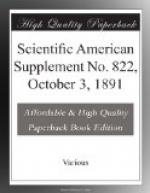Hardly had I observed these things, which are perfectly well known to those who have been able to familiarize themselves with the ordinary effects of compressed air as used in caissons and submarine works of various kinds, when my attention became attracted by what at first appeared to be a phenomenon of trivial importance. In a word, I observed that some of the men exposed to the effects of the compressed air were more exhilarated by it than others. Upon superficial reflection one might have supposed that this discrepancy in physiological effect was to be accounted for merely on the basis of constitutional idiosyncrasy; maturer thought, however, convinced me that the exaggerated effects of the condensed air were both too numerous and too constant to be amenable to such an explanation. This led me to study the habits of the men; and thus it was that I arrived at a discovery of real practical value to neurotherapy. To be brief, I found that a certain percentage of the men, before entering the compressed air employed in the construction of the Hudson River tunnel, were in the habit of drinking a quantity of alcohol, usually in the form of whisky. So long as these men remained outside the tunnel, where the atmospheric conditions were normal, they were not visibly affected by their potations. When, however, they entered the compressed air of the tunnel, but a short time elapsed before they became exhilarated to an inordinate degree, acting, as one of the foremen graphically expressed it, “as though they owned the town.”
On the other hand, when the customary draught of alcohol was withheld from them, these same men were no more, if as much, exhilarated on entering the compressed air as were their fellows.
The effects of alcohol, then, are enhanced by exposing the subject to the influence of an atmosphere condensed to a considerable degree beyond that of the normal atmosphere.
Acting on the hint derived from this discovery, I proceeded to administer absinthe, ether, the wine of coca, vermouth, champagne, and other stimulants, before exposing the subject to the influence of the condensed atmosphere, and invariably observed analogous effects, i.e., palpable augmentation of the physiological effects of the remedy.
Upon what principle does this augmentation of physiological effect depend? how is it to be accounted for?
In my opinion, the answer to this question may be given as follows: In the first place, we know that the primary effect of the compressed air upon the organism must be to force the blood from the surface of the body toward the interior, and especially into the cerebro-spinal canal. Or, to express it more succinctly, the blood will be forced in the direction of the least resistance, that is, into the soft organs inclosed by bony walls, which latter completely shut out the element of counter-pressure. Now, when the blood stream is freighted with a soluble chemical of some sort—let us say, for the present,




